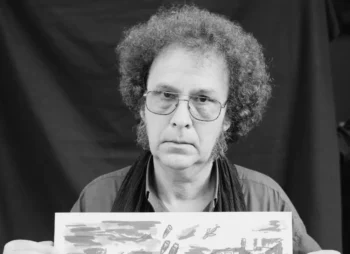Doessekker, Bruno

Bruno Doessekker (born 12 Feb. 1941) is a Swiss national who invented from scratch the story of his alleged gruesome childhood spent at the Auschwitz and Majdanek Camps. It was published in 1998 as a book under the pen name Binjamin Wilkomirski (in English as Fragments), and was praised by the Holocaust orthodoxy for its gripping narrative, who bestowed honors and prizes on Doessekker. That same summer, a Swiss investigative journalist exposed the story as complete fiction, as it turned out that Doessekker had never left Swiss territory during the war years (Weltwoche, 27 August 1998, pp. 46f.; Mächler 2000, Ganzfried 2002). The reason why the entire Holocaust elite was so easily fooled by Doessekker was explained by Jewish mainstream author Howard Weiss:
“Perhaps no one was ready to question the authenticity of the [Doessekker] account because just about anything concerning the Holocaust becomes sacrosanct.” (Chicago Jewish Star, 9-29 Oct. 1998; cf. Weber 1998)
Holocaust dogmatist Deborah Lipstadt was ready to ignore this fraud by stating that this forgery “might complicate matters somewhat. But [the book] is still powerful” as a novel (Forward, 18 Sept. 1998, p. 1). And Jewish author Judith Shulevitz encouraged others to be more subtle with their forgeries so as to remain undiscovered (Ottawa Citizen, 18 Nov. 1998):
“I cannot help wishing Wilkomirski-Doessek[k]er had been more subtle in his efforts at deception, and produced the magnificent fraud world literature deserves.”
Deborah Dwork, at that time director of the Center for Holocaust Studies at Clark University, Worcester, Massachusetts, insisted that Doessekker was not a perpetrator but rather a victim, “a deeply scarred man” exploited by his publisher (New York Times, 3 Nov. 1998). Israel Gutman, then director of the Yad Vashem Museum in Jerusalem, claimed it is irrelevant that Doessekker lied (Finkelstein 2000):
“Wilkomirski has written a story which he has experienced deeply; that is for sure. […] He is not a fake. He is someone who lives this story very deeply in his soul. The pain is authentic.”
Such astonishing attempts to whitewash admitted lies is telling; Holocaust “witnesses” and “survivors” know they can lie with impunity, and that the orthodoxy will protect and cover for them, even when caught in the act. Such mendacity casts doubt on all survivors, putting all firsthand accounts into question. (See also the entry on false witnesses.)

You need to be a registered user, logged into your account, and your comment must comply with our Acceptable Use Policy, for your comment to get published. (Click here to log in or register.)